
Topics
Guests
- Tony Bennformer British Cabinet minister and MP. He was the longest-serving MP in the history of the British Labour Party, having served for more than half a century.
Tony Benn, the former British Cabinet minister, longtime Parliament member and antiwar activist, has died at the age of 88. He was the longest-serving member of Parliament in the history of Britain’s Labour Party, serving more than half a century. He left Parliament in 2001, saying he planned to “spend more time on politics.” In 2009 he appeared on Democracy Now! to talk about the war in Afghanistan and Britain’s fight for a nationalized healthcare system. “You’ve got to judge a country by whether its needs are met and not just by whether some people make a profit,” Benn said. “I’ve never met Mr. Dow Jones, and I’m sure he works very, very hard with his averages — we get them every hour — but I don’t think the happiness of a nation is decided by the share values in Wall Street.”
Transcript
AMY GOODMAN: We wrap up now with this latest news that just came in hours ago, and this is the death of Tony Benn. Today we remember Tony Benn. The former British Cabinet minister, longtime member of Parliament, antiwar activist has died at the age of 88, the longest-serving member of Parliament in the history of Britain’s Labour Party, serving more than half a century. He left Parliament in 2001, saying he planned to “spend more time on politics.”
Sharif Abdel Kouddous and I interviewed Tony Benn in 2009, one day after he led a protest against the war in Afghanistan in London. At the rally, Benn and others read the names of British soldiers and Afghan civilians who died in the war. I began by asking Tony Benn about the protest and Afghanistan.
TONY BENN: Well, it was a solemn occasion, and the names were read.
But, you see, I think you have to understand the history of this. Britain invaded Afghanistan in 1839, captured Kabul, and was defeated the following year, and 15,000 British troops were killed in the retreat. Britain invaded Afghanistan in 1879. Britain was in Afghanistan in 1919. The Russians were in Afghanistan. I led a delegation to the Russian ambassador in London to protest that. The United States government, President Bush, the first one, funded Osama bin Laden to fight the Russians to get them out of Afghanistan.
And the situation we’re in now is very straightforward. The United States and NATO, 40 countries with 64,000 troops, in eight years have been unable to defeat the Taliban. And this is a Vietnam War for America and for the rest of the—well, for the people involved, soldiers and civilians on both sides, it’s an absolute tragedy.
SHARIF ABDEL KOUDDOUS: And Obama defended the war yesterday, calling it “a war of necessity.” Your response to that?
TONY BENN: Well, I think you just have to ask yourself the question: Is it a war on terror, or is it a war on Afghanistan? It’s a war on Afghanistan. And to call it a war on terror just entitles you to do what you like. And I don’t think it’s going to succeed.
The other thing I have in mind is very simple. A few years ago, London was bombed by terrorists. And how did it end—from northern Ireland. How did it end? It ended when we talked to Gerry Adams, who was the IRA leader in prison. Nelson Mandela was denounced as a terrorist by Mrs. Thatcher, and peace came in South Africa when the South African government talked to Mandela, and he came out and became president. I mean, history tells you, and Churchill put it very clearly: Jaw-jaw, talking, is better than war-war. And there will have to be negotiations with al-Qaeda and Taliban to secure the end of this conflict. Of that, I have no doubt whatsoever.
SHARIF ABDEL KOUDDOUS: Well, Tony Benn, we also wanted to talk to you about the issue of healthcare.
AMY GOODMAN: Tony Benn, you’re a former Cabinet minister, longest-serving MP in the history of the British Labour Party. Explain your system in Britain and what the battle looks like to you across the Atlantic in the United States.
TONY BENN: Well, I mean, for me—and I love, know America. I’m married to an American, known America for 70 years. It’s amazing. I think most people in Britain just regard it as being uncivilized for a great, rich country to ignore the health of 47 million people. And I don’t say that as an insult; we just don’t understand it.
It was set up in Britain in 1948, 61 years ago. And I have with me the statement made by the government at the time. “Your new National Health Service begins on the 5th of July. […] How do you get it?
“It will provide you with all medical, dental, and nursing care. Everyone—rich or poor, man, woman or child—can use it or any part of it. There are no charges, except for a few special items. There are no insurance qualifications. But it is not a 'charity'. You are all paying for it, […] as taxpayers, and it will relieve your money worries in time of illness.”
And, I mean, my family has benefited enormously. I had an operation a few days ago in London. I’ve got a pacemaker put in under the Health Service. My wife died of cancer and for four years had the most brilliant healthcare.
And I suppose one way of looking at it is this: There’s a lot unemployment in the United States, as there is in Britain, and one way of creating jobs would be to build hospitals, recruit nurses, train doctors, and then meet the health needs of the country, as well.
I just don’t understand what’s being said. Well, I do understand, because I know the people who are saying it. But it’s absolutely no relation to the Health Service in Britain or the needs of the United States.
AMY GOODMAN: Finally, any thoughts on the comparison of the debate you’re seeing today with what happened before the British—the National Health Service was ushered in in Britain? Are you seeing an echo of it?
TONY BENN: Yes, in a way. I mean, some of the doctors were opposed to it, but they all came around. Some of the consultants said, “We don’t want to be civil servants.” But they’re not civil servants. You had a little bit of it.
But I’ll tell you what really changed it, and it takes you back to the 1930s. We had mass unemployment, as you did in the United States. And I was a pilot in the Royal Air Force in the war, and we were discussing on a troop ship coming home once how we would deal with the problems of unemployment. And one lad got up, and he said something I’ve never forgotten. He said, “In the 1930s we had mass unemployment, but we don’t have unemployment when we’re killing Germans.” He said, “If you can have full employment by killing Germans, why can’t you have full employment by building hospitals, building schools, recruiting teachers, recruiting nurses, recruiting doctors?” And that’s how we got it.
We took the view that a government had a responsibility to focus on the needs of a nation in peacetime in the way in which it does in wartime. And if that principle is followed, then all the ideological language can be set aside. You’ve got to judge a country by whether its needs are met, and not just by whether some people make a profit. I’ve never met Mr. Dow Jones, and I’m sure he works very, very hard with his averages—we get them every hour—but I don’t think the happiness of a nation is decided by the share values in Wall Street.
AMY GOODMAN: That’s Tony Benn appearing on Democracy Now! in 2009. He has died at the age of 88.
And that does it for our broadcast. Tonight I’ll be in Santa Fe, New Mexico celebrating New Mexico public television and radio at the Lensic theater; tomorrow night in Denver at 7:00 p.m. Check our website, democracynow.org, for details.
Oh, a very special thanks to our crew here at Northern Arizona University’s NAU-TV, home of the live daily student TV newscast, NAZ Today. Thanks to Joe Chitwood and Bill Ferris, Kimberly Craft, Holly Switay, Simone Malveau, Miles Schneiderman, Mayson Agnew, Kyle Benedict, Alex Lucero, Kaleigh Emery, Adrian Gurrola, Joy Coleman, Emani Payne, Steve Young and to our uplink engineer, Tom Bradshaw. And special thanks also to Fred Solop and our host committee here in Flagstaff.

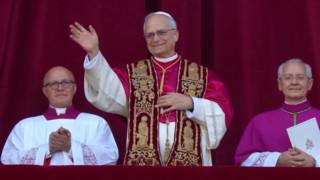
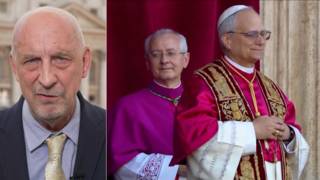

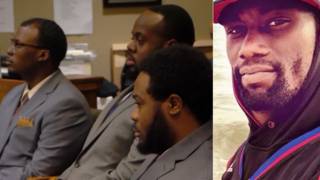
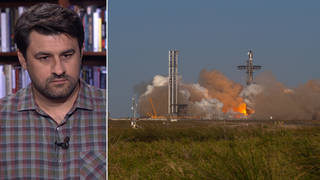




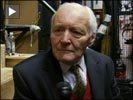

Media Options